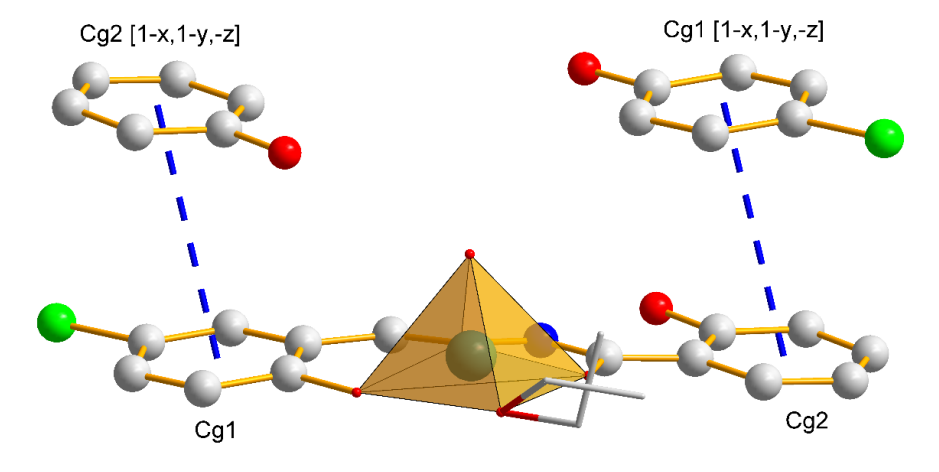Synthesis, structure and properties of V(III, IV and V) complexes with ONO Schiff bases
DOI:
https://doi.org/10.5604/01.3001.0013.1505Keywords:
vanadium, complex, Schiff base, oxidation state, structure, IR, UV-Vis, EPRAbstract
The synthesis and physicochemical properties of vanadium(III,IV,V) complexes with Schiff base ligands based on 3,5-dibromo-4-methoxy-salicylaldehyde and phenylacetic hydrazide (H2L1), 5-chlorosalicylaldehyde and 4-hydroxybenzhydrazide (H2L2) and 5-chlorosalicylaldehyde and 2-hydroxybenzhydrazide (H2L3) were presented. The formulas of the complexes {[V(L1)(HL1)]·EtOH (1), [VO(L2)(phen)]·2H2O (2) and [VO(L3)(EtO)] (3)} were proposed based on the elemental analysis, IR and UV-Vis spectra. Additionally, the IR and UV-Vis spectra (in solvents as well as in a solid state) have been discussed from the vanadium oxidation state point of view. The single crystal structure of 3 shows triclinic, P-1 space group, structure is stabilized by hydrogen bonds and strong π-π stacking interactions. The oxidation state of the metal centre was also confirmed by the magnetic susceptibility measurements. The stability of the complexes was measured in pH = 7.00 and in pH = 2.00 which allows to evaluate the use of these compounds as insulin mimetic compounds.
Downloads
References
Rehder D. Perspectives for vanadium in health issues. Future Medicinal Chemistry. 2016; 8:325-338. Google Scholar
Datta C, Das D, Mondal P, Chakraborty B, Sengupta M, Bhattacharjee CR. Novel water soluble neutral vanadium(I)-antibiotic complex: Antioxidant, immunomodulatory and molecular docking studies. European Journal of Medicinal Chemistry. 2015; 97:214-224. Google Scholar
Cransab DC, Trujillo AM, Pharazyn PS, Cohen MD. How environment affects drug activity: Localization, compartmentalization and reactions of a vanadium insulin-enhancing compound, dipicolinatooxovanadium(V). Coordination Chemistry Reviews. 2011; 255(19-20):2178-2192. Google Scholar
Poucheret P, Verma S, Grynpas MD, McNeill JH. Vanadium and diabetes. Molecular and Cellular Biochemistry. 1998; 188:73–80. Google Scholar
Rehder D. Structure and function of vanadium compounds in living organisms. Biometals. 1992; 5(1):3-12. Google Scholar
Doucette KA, Hassell KN, Crans DC. Selective speciation improves efficacy and lowers toxicity of platinum anticancer and vanadium antidiabetic drugs. Journal of Inorganic Biochemistry. 2016; 165:56-70. Google Scholar
Levina A, McLeod AI, Gasparini SJ, Nguyen A, De Silva WGM, Aitken JB, Harris HH, Glover C, Johannessen B, Lay PA. Reactivity and Speciation of Anti-Diabetic Vanadium Complexes in Whole Blood and Its Components: The Important Role of Red Blood Cells. Inorganic Chemistry. 2015; 54(16):7753-7766. Google Scholar
Thompson KH, Orvig C. Vanadium in diabetes: 100 years from Phase 0 to Phase I. Journal of Inorganic Biochemistry. 2006; 100(12):925-1935. Google Scholar
Abbasi Z, Salehi M, Khaleghian A, Kubicki M. Co(III), V(IV) and Cu(II) complexes of bidentate N,O-donor Schiff base ligands: Characterization, anticancer activities and metal oxide nanoparticles preparation via solid state thermal decomposition. Applied Organometallic Chemistry. 2018; 32:e4542. Google Scholar
Crans DC, Yang L, Haase A, Yang X. Health Benefits of Vanadium and Its Potential as an Anticancer Agent. Metal ions in life sciences. 2018; 18:251-279. Google Scholar
Rozzo C, Sanna D, Garribba E, Serra M, Cantara A, Palmieri G, Pisano M. Antitumoral effect of vanadium compounds in malignant melanoma cell lines. Journal of Inorganic Biochemistry. 2017;174:14-24. Google Scholar
Bishayee A Waghray A, Patel MA, Chatterjee M. Vanadium in the detection, prevention and treatment of cancer: The in vivo evidence. Cancer Letters. 2010; 294(1):1-12. Google Scholar
Irving E, Stoker AW. Vanadium Compounds as PTP Inhibitors. Molecules. 2017; 22(12):2269. Google Scholar
Bhanot S, Michoulas A, McNeill JH. Antihypertensive effects of vanadium compounds in hyperinsulinemic, hypertensive rats. Molecular and Cellular Biochemistry. 1995; 153(1-2):205-209. Google Scholar
Abdel-Rahman LH, Abu-Dief AM, Azza MB, Abdel-Mawgoud AH. Three novel Ni(II), VO(II) and Cr(III) mononuclear complexes encompassing potentially tridentate imine ligand: Synthesis, structural characterization, DNA interaction, antimicrobial evaluation and anticancer activity. Applied Organometallic Chemistry. 2017; 31(e3750):1-14. Google Scholar
Iyyam S, Sorimuthu P, Subramanian P, Kandaswamy M. A novel insulin mimetic vanadium–flavonol complex: Synthesis, characterization and in vivo evaluation in STZ-induced rats. European Journal of Medicinal Chemistry. 2013; 63:109-117. Google Scholar
Smith DM, Pickering RM, Lewith GT. A systematic review of vanadium oral supplements for glycaemic control in type 2 diabetes mellitus. QJM: An International Journal of Medicine. 2008; 101:351-358. Google Scholar
Spałek T, Pietrzyk P, Sojka Z. Application of the genetic algorithm joint with the Powell method to nonlinear least-squares fitting of powder EPR spectra. Journal of Chemical Information and Modeling. 2005; 45:18-29 Google Scholar
Nonius COLLECT. Nonius BV, Delft, The Netherlands; 1998. Google Scholar
Otwinowski Z, Minor W., Processing of X-ray diffraction data collected in oscillation mode. Methods in Enzymology, Vol. 276, Macromolecular Crystallography, Part A, edited by Carter Jr CW, Sweet RM, New York: Academic Press; 1997. p. 307–326. Google Scholar
Sheldrick GM. Crystal structure refinement with SHELXL. Acta Crystallographica C Structural Chemistry. 2015; 71:3-8. Google Scholar
Brandenburg K, Putz H. DIAMOND. Crystal Impact GbR, Bonn, Germany; 2015. Google Scholar
Schilt AA, Taylor RC. Infra-red spectra of 1:10-phenanthroline metal complexes in the rock salt region below 2000 cm−1. Journal of Inorganic and Nuclear Chemistry. 1959; 9:211-221. Google Scholar
Sanna D, Várnagy K, Lihi N, Micera G, Garribba E. Formation of New Non-oxido Vanadium(IV) Species in Aqueous Solution and in the Solid State by Tridentate (O, N, O) Ligands and Rationalization of Their EPR Behavior. Inorganic Chemistry. 2013; 52:8202-8213. Google Scholar

Downloads
Published
How to Cite
Issue
Section
License
Copyright (c) 2019 University of Applied Sciences in Tarnow, Poland & Authors

This work is licensed under a Creative Commons Attribution-NonCommercial 4.0 International License.



